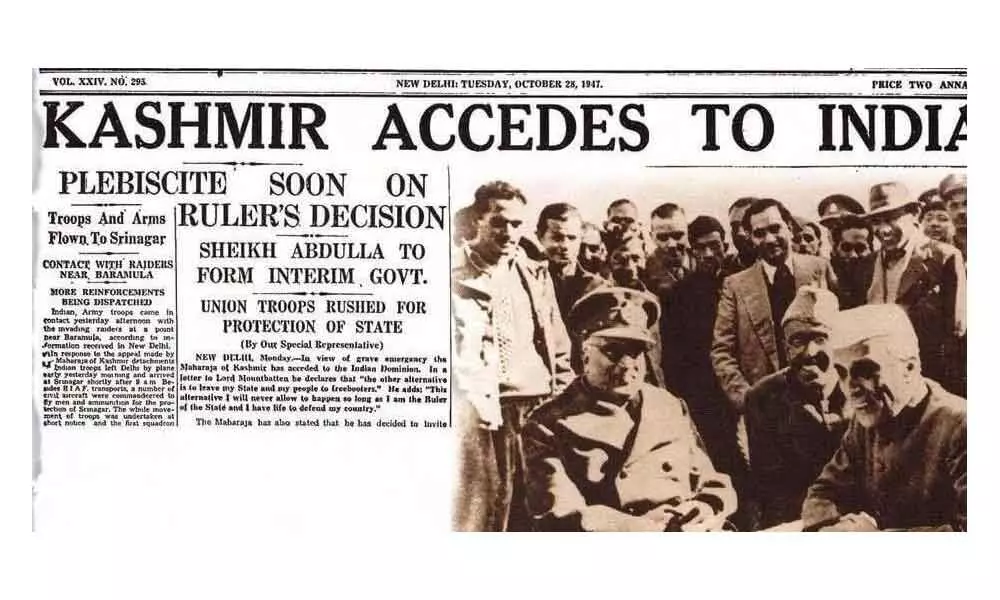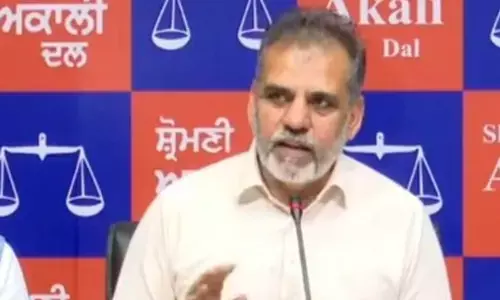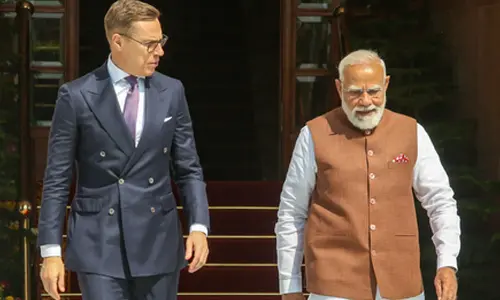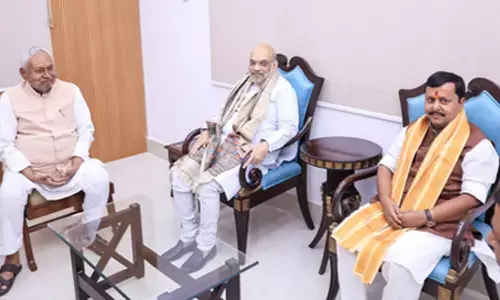Prolonged secrecy of J&K Accession

Prolonged secrecy of J&K Accession
Here is an interesting incident about the RTI Act. The CIC (Central Information Commission) agreed with appellant. Finds national interest in disclosure.
Here is an interesting incident about the RTI Act. The CIC (Central Information Commission) agreed with appellant. Finds national interest in disclosure. But there is no direction to disclosure. The CIC confined itself to 'request' or 'observation' or 'suggestion.'
Venkatesh Nayak, an RTI activist, officer in CHRI and researcher on J&K accession issues, has filed an RTI request on the prolonged secrecy around J&K accession documents. Nayak discovered an interview of Army Chief of India to biographer BR Nanda, two decades after his retirement in 1949. General Sir Francis Robert Roy Butcher served as second chief of the Indian Army between January 1, 1948 to January 15, 1949.
The operation of the Instruments of Accession was handled by Bucher and there are some documents that throw light on the truth of accession. Bucher made multiple references to files and papers related to Jammu and Kashmir affairs for the period 1947-49 compiled by him and given to the Nehru Memorial Museum Library NMML.
The year 2021 is the 75th anniversary year of signing of the Instrument of Accession by Maharaja Hari Singh. Nayak says it serves larger public interest to disclose these papers at least after 75 years. Information Commissioner Uday Mahurkar hesitated to use the expression larger public interest as contended by the applicant, but agreed that there is a "national interest" in his order. It's a great step forward in disclosure.
75 years of Secrecy
Venkatesh Nayak said that the NMML has kept these documents closed from public scrutiny even after 70 years on the instructions of the External Affairs Ministry. He sought inspection of files and records given by Bucher to NMML among other details such as a list of documents held by library.
Declassification
There is policy of declassification policy of official records by the government for the purpose of compiling war and operations histories by the ministry of defence which was put in public domain on June 12, 2021. Relying on this policy, applicant believed that the information sought...squarely falls within ambit and purpose of policy and shall be disclosed.
The CIC noted in its order that NMML CPIO submitted that they do not have any official intimation from the government to disclose this information despite the policy decision of the Central government.
Thus, it is clear that there is a pro-disclosure policy of the Government and NMML knew it. The Act nowhere provided that the CPIO has to seek permission from the 'third party' or higher officials. More over the RTI Act allows 20-year-old information be disclosed except under three clauses of Section 8. Neither the Ministry of External affairs nor the NMML have claimed that national security will be affected by the disclosure and hence denied under Section 8(1)(a) of RTI Act. It was not invoked because they knew that it will not fall under that category. There should be 'clear and present danger' flowing from disclosure to deny the information. A 75-year-old documents cannot cause clear danger now.
Nayak further contended that the access to the papers handed over by General Sir Roy Bucher to NMML will be of immense value to counter the controversy that has been created with regard to the actual date of signing of the Instrument of Accession and its acceptance. The said dates happen to be 26th and 27th of October, 1947 respectively, Nayak felt that these papers should be in public by 17th October 2021. It's a paradox that they call it Nehru Memorial Library, but lock up the documents preventing readers from glancing it.
No grounds for non-disclosure
Then why the External Affairs Ministry want to withhold it? What grounds are there in RTI Act for the NMML to deny? The NMML neither provided access nor gave reasons for refusal. The NMML did not cite any of the clauses given under the Section 8 or 9 of the Act, only under which it could be denied.
Not even third-party information?
When some ancient historic documents reach the Library, it cannot be equated with the files in the office to be considered as 'third party' information and invoke Section 11. Anyway Section 11 is not a ground for denial of information. Interestingly, the Commission ordered the NMML to approach the higher officials of External Affairs, but did not mention to follow procedure under Section 11. But advises the CPIO to seek permission from the bosses. If the CPIO uses the procedure or Section 11, he will retain the power of discretion to decide about disclosure and as per RTI Act, he does not need 'permission' from Ministry of External Affairs. If it is assumed that Ministry is third party and as the documents are sourced from that Ministry, the CPIO has to give notice to it under Section 11 only when he 'intends' to give information. Even of third-party refuses to give, the CPIO retains power to decide in his own discretion. All that is bypassed by the 'advice' of the CIC to 'approach higher officials for necessary permission'.
Nayak said it was the statutory duty of the CPIO to invoke the third-party procedure under Section 11 of the RTI Act to the CPIO, ministry of external affairs, to ascertain his or her views regarding disclosure of the Sir Roy Bucher papers. By not doing so, both the CPIO and the FAA have been neglectful of their duties under the RTI Act, he added.
The order without an order
The Order of Chief Information Commissioner at the Centre on 10th October 2021 recognising the 'national interest' in disclosure of files provided by India's second Army Chief General Sir Roy Bucher to Nehru Memorial Museum and Library about Jammu and Kashmir related to the period of 1947-49, is a welcome judgement. However, concluding the judgment with just an observation reflects the present state of affairs of the implementation of this right by the independent Commission as envisaged by Right to information Act-2005. The CIC properly understood that this disclosure could throw light on Accession. This is an interesting order of CIC.
The access commission should have directed disclosure of the information as ordained by RTI Act. Instead, the CIC suggested the NMML's central public information officer 'to take up the matter with higher officials' and 'secure the necessary permission'. The position of the applicant remains same as before the CIC hearing. According to so called 'order' of the CIC, without 'necessary permission' of higher officials, the CPIO cannot share the information. It is doubtful. Nayak cannot also complain of non-compliance because it amounts to total compliance the moment CPIO asks the higher officials to take up the matter. When there is no order, where will be the compliance?
The CIC said: "Keeping in view the facts of the case and the submissions made by both the parties, the commission observes that the objective of the appellant (is) in the national interest. Therefore, the commission directs the CPIO to take up the matter with higher officials of the respondent authority and cite this order of the commission and secure the necessary permission from them before sharing the information with the appellant." Throwing the request back to the CPIO with a 'request' by CIC to seek necessary permissions for disclosure of documents, which it agrees to be disclosed in national interest, dilutes the legal guarantee of access to information.
(The author is Dean & Professor, School of Law, Mahindra University, Hyderabad, and former Central Information Commissioner) (The opinions expressed in this column are those of the writer. The facts and opinions expressed here do not reflect the views of The Hans India)










